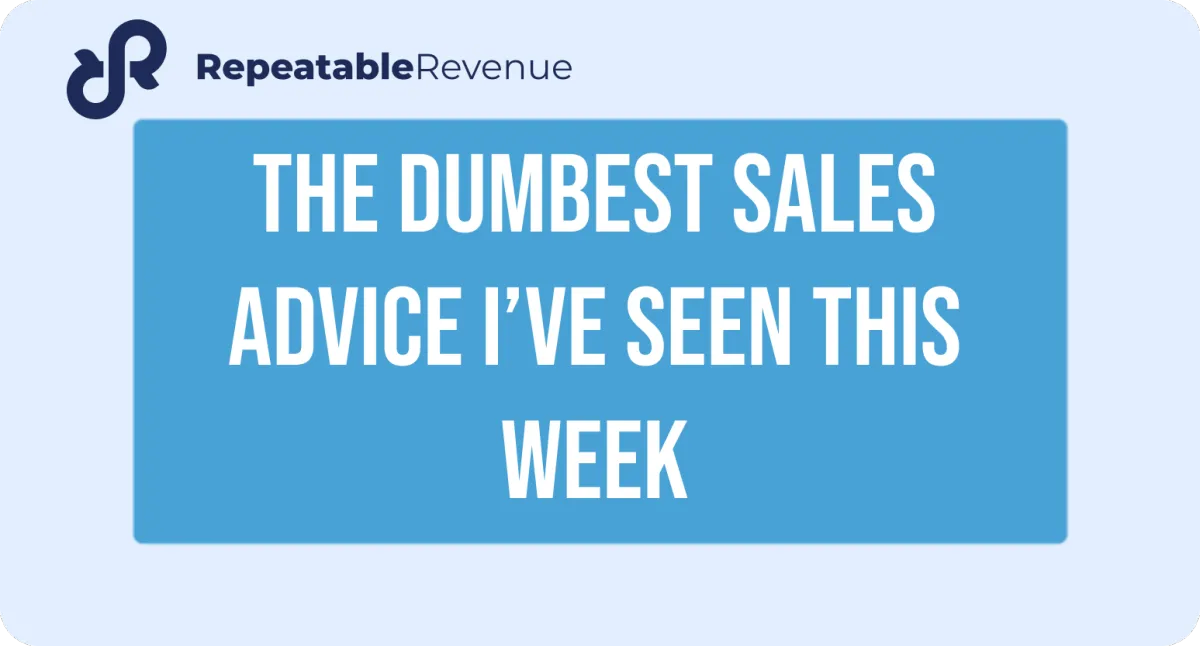
The Dumbest Sales Advice I’ve Seen This Week
So I had a few minutes to kill the other day and opened up Facebook. An ad pops up with this hook:
"Every sales expert tells you the same lie:"
I click. I can't help myself.
And the hot take?

You just need to buy his $37 course to learn how to sell without "rapport."
I see this nonsense everywhere. And it reveals a massive misunderstanding of what rapport actually is.
Let's set the record straight.
Small Talk Is Not Rapport
Talking about the weather, someone's dog, or their favorite football team? That's called exchanging pleasantries. Sure, some people enjoy that. Maybe it warms up the room. But it's not required.
More importantly: it's not rapport.
True rapport is trust.
In sales or leadership, rapport means the other person believes:
You understand their world
You get the real problem they're trying to solve
You're safe to open up to
That's it. Rapport is about credibility, not likability.
Why This Actually Matters
If you don't build the right kind of rapport, prospects won't open up during discovery.
That creates two problems:
1. You don't get the information you need to strategically present your services in the best light. It's tough to tie your solution back to their biggest problems when you don't know what they are.
2. Your proposal won't carry much weight as a credible solution. Would you trust a prescription from a doctor when you know you didn't share all your symptoms?
Building The Rapport You Actually Need
The $37 course guru missed what rapport is and the role it plays in sales.
The one thing he got right? Small talk is overrated when it comes to earning the trust you need to close deals. Whether we're rooting for the same football team has zero relevance to whether I believe you can solve my problem.
Real rapport is built two ways:
1. Right from the start with how you position yourself:
Show up professionally—on time, put-together, and prepared • Project calm confidence—not nervous energy or neediness.
Lead the call like you know what you're doing—set the agenda and stick to it.
Reference something specific to their business that shows you've done your homework.
Ask smart, targeted questions that signal you've seen their world before.
2. Through the quality of questions you ask throughout the process:
Rapport-building isn't a one-time event. It compounds through smart discovery:
Ask questions that show you understand their world—industry-specific, problem-aware, not generic.
Use layered follow-ups that dig deeper instead of moving to the next script line.
Ask about impacts, not just symptoms. What's this problem costing them in time, money, or sanity?
Tie your questions back to what they've already told you—prove you're listening.
Don't be afraid to challenge assumptions (respectfully). It signals expertise and positions you as an equal, not a vendor
This kind of questioning doesn't just get you better answers.
It builds the trust you need to move deals forward—without relying on charm or chit chat.
Want Better Sales Conversations?
Stop showing up like a salesperson your prospect has to question. Start showing up like a trusted consultant.
That's how you close more than just "order taker" deals.
Adios,
Ray
